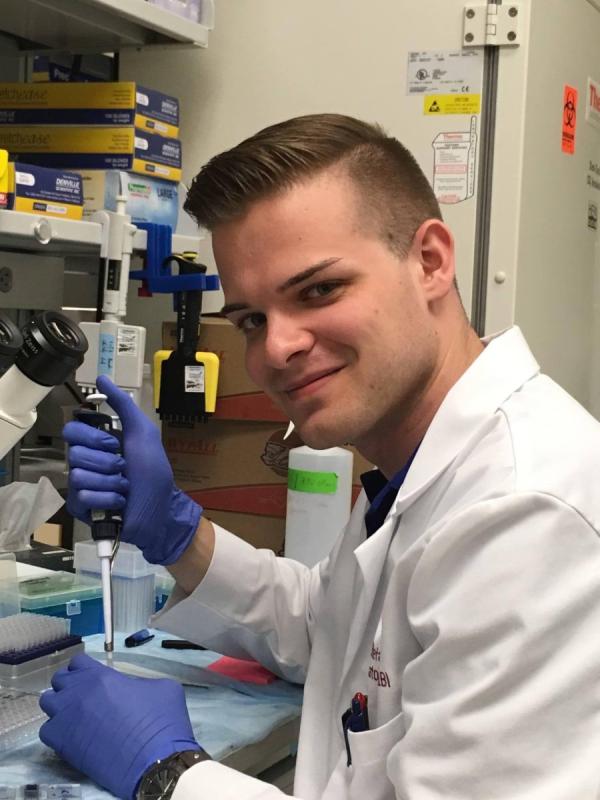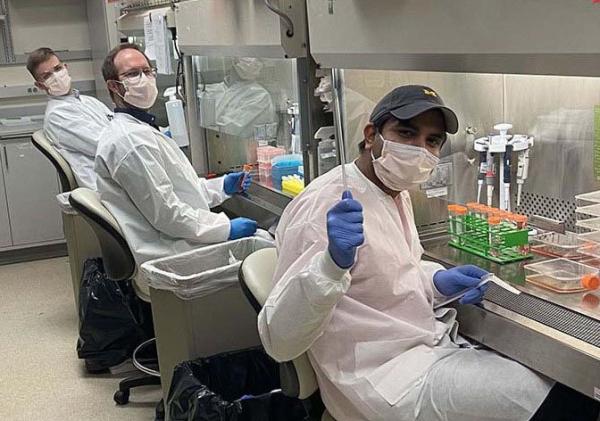Postdoc Profile: From Bench to Bedside and Back Again
Dr. Stefan Barisic Turns Laboratory Discoveries into Kidney Cancer Treatments

Dr. Stefan Barisic
The Laboratory of Transplantation Immunotherapy sits at the heart of the NIH Clinical Center, just down the hallway from the Southeast inpatient unit. Here, IRP postdoctoral research fellow Stefan Barisic, M.D., labors at the bench with the goal of creating practical treatments for kidney cancer patients. Having such proximity to his patients was one of the chief attractions of working at NIH for Dr. Barisic.
“The NIH Clinical Center is an amazing place because it has all the resources you need to go from the bench to the bedside and back to the bench all in one building,” says Dr. Barisic.
Before joining NIH’s National Heart, Lung, and Blood Institute (NHLBI), Dr. Barisic earned his M.D. at the University of Belgrade School of Medicine in Serbia. When he arrived in the U.S., he brought a deep concern for his patients’ welfare and a passion for cancer research. At NHLBI, alongside senior investigator Richard Childs, M.D., he has taken a novel immunotherapy approach to cancer treatment.
“Immunotherapy is an emerging treatment for cancer that relies on re-educating the body’s immune system to recognize and destroy cancer cells,” Dr. Barisic explains. “The challenge is finding something unique to cancer cells — something the immune system can pick out and not confuse with healthy cells nearby.”
Dr. Barisic and his team have identified one particularly promising target for immunotherapy aimed at kidney cancer: an ancient virus that integrated into human DNA long ago, even in healthy people. This ‘endogenous retrovirus’ typically remains inactive; however, in kidney cancer cells, this ‘zombie DNA’ becomes re-activated, making it a useful target for therapy. By genetically modifying human immune cells in the lab, it is possible to direct them to selectively attack kidney cancer cells harboring this undead virus without harming healthy tissues.
Dr. Barisic describes his research in this NIH SciBites video.
Dr. Barisic first demonstrated the effectiveness of targeting this endogenous retrovirus by testing the approach’s potential in kidney tumor cells isolated in the lab. He showed that genetically engineered human immune cells could kill the tumor cells. He is now part of a clinical trial team testing this treatment in patients and is hopeful that the research will yield a safe and effective treatment for kidney cancer.
Unfortunately, this particular immunotherapy approach is limited to patients with a particular type of human leukocyte antigen (HLA) marker on their cells. That HLA variant allows the therapy to work, but it is present only in a minority of the population. To enable the therapy to work in a broader set of patients with other HLA types, Dr. Barisic is spending the rest of his time as a research fellow at NHLBI working on identifying additional immunotherapy targets. When he eventually departs NIH to begin his clinical residency training in the U.S., he will leave knowing that Dr. Childs and his talented research team will continue this critical investigation.

Dr. Barisic (back) works with a large team of talented researchers and clinicians, including clinical fellow Joseph Clara, M.D., (middle) and postbaccalaureate fellow Ujjawal Savani (front).
Indeed, Dr. Barisic credits much of his success to the supportive and diverse group of researchers he works with at NHLBI. One of the most important lessons he has learned during his time at NIH is to take advantage of the wealth of expertise in the IRP.
“Other people have knowledge that you don’t, so don’t be shy to ask questions,” he says.
Even after he resumes working directly with patients, Dr. Barisic intends to continue merging clinical practice and laboratory research. Having one foot in each of those worlds, he believes, can help researchers like himself accelerate the development of life-saving treatments.
“In addition to practicing today’s medicine,” he says, “I want to help create the medicine of tomorrow.”
Subscribe to our weekly newsletter to stay up-to-date on the latest breakthroughs in the NIH Intramural Research Program.
Related Blog Posts
This page was last updated on Monday, January 29, 2024
